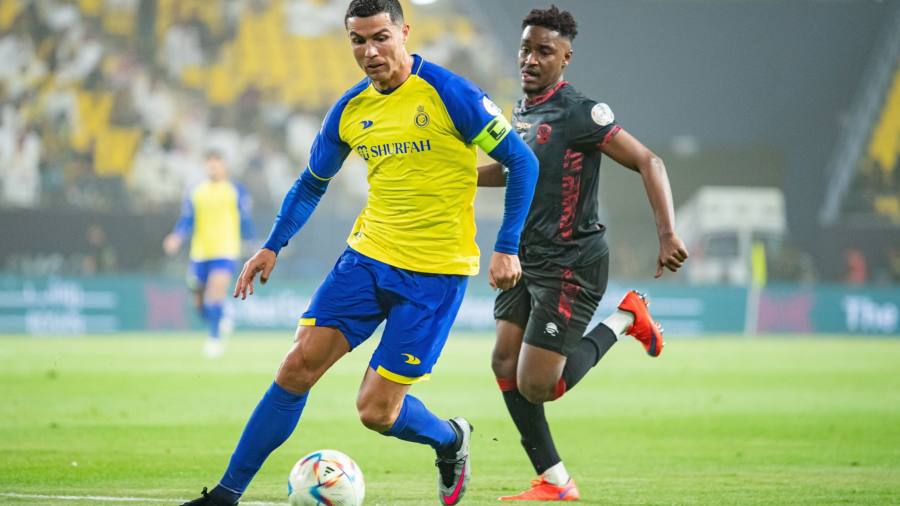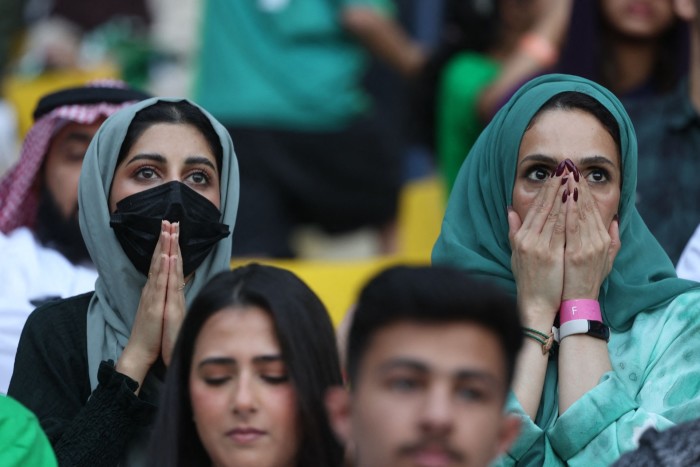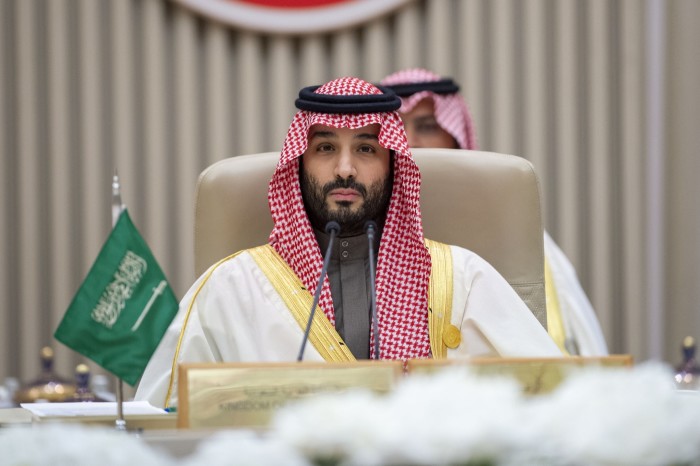
Cristiano Ronaldo’s $200mn-a-year move to Saudi Arabia was dismissed by critics when it was announced in January as just another sportswashing stunt by a country with a dire human rights record.
Yet it proved only the start of a football spending spree. Having signed other late-career stars including Karim Benzema from Real Madrid, Saudi clubs, several of which have recently been taken over by the $650bn sovereign Public Investment Fund, are now targeting players still in their prime, forking out large transfer fees and bumper wage packets to lure talent away from the European game.
The strategy has alarmed some in the football world. “Saudi have taken over golf, the big boxing fights & now they want to take over football!!! This sports washing needs to be stopped”, former Liverpool defender Jamie Carragher said on Twitter last month.
Saudi Arabia’s dash into the world’s most loved sport has drawn comparisons with previous, unsuccessful efforts to redraw the map of global football. Well-funded challenges have been and gone before, notably from China — where a costly effort to bring international stars to the domestic league swiftly buckled under the weight of financial reality. Some see another shortlived bubble in the making, others an expensive rebranding campaign.
“What is worrying is the normalisation of Saudi Arabia. I search on Twitter and the first page is only about football,” said Ronan Evain, executive director of Football Supporters Europe, an umbrella group of fans in the region. “We can’t treat this solely as a football project.”
But the view is very different in Riyadh, which is at the centre of Crown Prince Mohammed bin Salman’s economic and social reform programme under which the kingdom has eased religious restrictions on public life while spending billions to develop industries ranging from electric vehicles and tourism to gaming and sports.

In a football-mad country where a majority of citizens are under the age of 30, upgrading a flagging league from a regional curiosity to one that would grab the world’s attention seemed like a natural bet, according to Eman Alhussein, a non-resident fellow at the Gulf States Institute in Washington.
“I think it’s too simplistic to look at Saudi Arabia’s investment in sports from a sportswashing perspective,” she said. “Saudi Arabia’s diversification plans, growing regional competition and nation-branding efforts all play a role in the kingdom’s venture into sports both domestically and abroad.”
Bringing in international stars has been one part of the plan to upgrade the league, alongside an overhaul of the Saudi clubs’ governance. The $650bn sovereign Public Investment Fund, which is chaired by Crown Prince Mohammed and acquired English Premier League club Newcastle United in 2021, turned its attention to home last month and took control of the four top Saudi clubs to streamline their operations.
“Like every football-loving nation, we want to build and enjoy the best league possible, one that sits at the top of our football pyramid, inspires our people and excites all fans,” Bader Alkadi, Saudi vice-minister of sports, told the Financial Times.
Alkadi dismissed allegations of sportswashing, which come after repeated criticism of the kingdom for its routine detention of critics and mass executions of convicts, and several years after the killing in Istanbul of journalist Jamal Khashoggi by Saudi state agents.
The new sports drive has included a foray into golf, with the kingdom setting up a rival circuit to the US PGA Tour, battling it in court then agreeing to a merger that has set off objections from US lawmakers. Saudi Arabia has also invested in motorsport, horseracing and boxing, and is in talks on potential deals in tennis.
Critics have condemned the moves as an effort to clean up the country’s image abroad.
But Alkadi said such criticism typically came “from those who don’t visit the country, don’t see or welcome the progress . . . Since 2020 alone, the number of sports federations in Saudi Arabia has increased by over 50 per cent. In 2015 sports participation and physical activity levels across the adult population were only 13 per cent . . . and now sits at 48 per cent.”
Saudi officials say the strategy also feeds into another Saudi ambition, to become a tourism hub. While efforts to lure Lionel Messi, the Argentine football star who many see as the greatest of all time, ultimately failed, he remains on a lucrative contract to promote travel to the kingdom.
“Working with tourism ambassadors like Messi is just one part of our strategy to show the world what we have to offer, and that it is now easier than ever to visit,” said Saudi Tourism Authority chief Fahd Hamidaddin.
Riyadh’s more assertive push to boost football at home began almost immediately after the World Cup in neighbouring Qatar late last year, when Saudi Arabia’s unexpected victory over eventual champions Argentina in the group stages was one of the highlights of the tournament.
The Saudi government has now set its sights on bringing the World Cup back to the region, potentially as soon as 2030 with a mooted joint bid with Greece and Egypt.

It may also have an eye on the Club World Cup, which is due to be relaunched in a new format in 2025. Fifa is hoping to make the contest a global rival to Europe’s Champions League — a tournament that generates billions of euros of revenue from broadcast deals each year.
The revamped Fifa tournament will pit 32 teams against each other, including four from the Asian Football Confederation in which Saudi teams compete. Ah Ahli, one of the four Saudi teams recently transferred to the PIF, has already qualified having won the Asian Champions League in 2021. Saudi Arabia will host the Club World Cup later this year under its current guise.
Christian Nourry, managing partner at Retexo Intelligence — a consultancy that advises clubs on their player purchases — said the impact of Saudi spending on the European transfer market had already been “significant” by pushing up wage demands, delaying contract renewals and forcing clubs to replace players they thought would stay.
“The biggest teams in Europe are still trying to understand which players they might lose and how much money they will have to spend to find either short-term or long-term fixes to departures they may not have been expecting,” he said.
Uefa president Aleksander Čeferin has been more dismissive, describing the current rush to bring players to Saudi Arabia as “a mistake” and comparing it to an earlier doomed effort to turn China into a global football power.
For a brief period in the middle of last decade, Chinese clubs paid out huge transfer fees and agreed record-breaking wages to tempt big-name signings and famous coaches to the Chinese Super League.
Investors from the mainland also snapped up some of the biggest clubs in Europe, including both Inter Milan and AC Milan, and took stakes in the likes of Manchester City and Atlético Madrid.
But the grand project quickly unravelled after many of the private companies driving the push ran out of money and Beijing pulled its political support. The domestic league was left in disarray, and many of China’s overseas acquisitions were unwound.
Riyadh’s sporting ambitions are unlikely to face similar financial constraints. The sovereign wealth fund is now planning to launch a sports investment company with a multibillion-dollar war chest to make further acquisitions.
“Saudi Arabia is trying to play catch-up, and it’s using its financial muscle to do that,” said Simon Chadwick, professor of sport and geopolitical economy at Skema Business School. “We’ve got Saudi Arabia trying to do in a few years what has taken the English Premier League decades.”